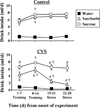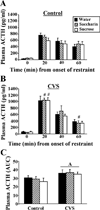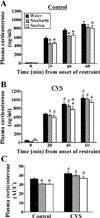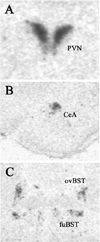Daily limited access to sweetened drink attenuates hypothalamic-pituitary-adrenocortical axis stress responses
- PMID: 17204558
- PMCID: PMC4408907
- DOI: 10.1210/en.2006-1241
Daily limited access to sweetened drink attenuates hypothalamic-pituitary-adrenocortical axis stress responses
Abstract
Stress can promote palatable food intake, and consumption of palatable foods may dampen psychological and physiological responses to stress. Here we develop a rat model of daily limited sweetened drink intake to further examine the linkage between consumption of preferred foods and hypothalamic-pituitary-adrenocortical axis responses to acute and chronic stress. Adult male rats with free access to water were given additional twice-daily access to 4 ml sucrose (30%), saccharin (0.1%; a noncaloric sweetener), or water. After 14 d of training, rats readily learned to drink sucrose and saccharin solutions. Half the rats were then given chronic variable stress (CVS) for 14 d immediately after each drink exposure; the remaining rats (nonhandled controls) consumed their appropriate drinking solution at the same time. On the morning after CVS, responses to a novel restraint stress were assessed in all rats. Multiple indices of chronic stress adaptation were effectively altered by CVS. Sucrose consumption decreased the plasma corticosterone response to restraint stress in CVS rats and nonhandled controls; these reductions were less pronounced in rats drinking saccharin. Sucrose or saccharin consumption decreased CRH mRNA expression in the paraventricular nucleus of the hypothalamus. Moreover, sucrose attenuated restraint-induced c-fos mRNA expression in the basolateral amygdala, infralimbic cortex, and claustrum. These data suggest that limited consumption of sweetened drink attenuates hypothalamic-pituitary-adrenocortical axis stress responses, and calories contribute but are not necessary for this effect. Collectively the results support the hypothesis that the intake of palatable substances represents an endogenous mechanism to dampen physiological stress responses.
Figures








Similar articles
-
"Snacking" causes long term attenuation of HPA axis stress responses and enhancement of brain FosB/deltaFosB expression in rats.Physiol Behav. 2011 Apr 18;103(1):111-6. doi: 10.1016/j.physbeh.2011.01.015. Epub 2011 Jan 22. Physiol Behav. 2011. PMID: 21262247 Free PMC article.
-
HPA axis dampening by limited sucrose intake: reward frequency vs. caloric consumption.Physiol Behav. 2011 Apr 18;103(1):104-10. doi: 10.1016/j.physbeh.2010.12.011. Epub 2010 Dec 17. Physiol Behav. 2011. PMID: 21168428 Free PMC article.
-
The role of the posterior medial bed nucleus of the stria terminalis in modulating hypothalamic-pituitary-adrenocortical axis responsiveness to acute and chronic stress.Psychoneuroendocrinology. 2008 Jun;33(5):659-69. doi: 10.1016/j.psyneuen.2008.02.006. Epub 2008 Apr 2. Psychoneuroendocrinology. 2008. PMID: 18378095 Free PMC article.
-
The medial amygdala modulates body weight but not neuroendocrine responses to chronic stress.J Neuroendocrinol. 2010 Jan;22(1):13-23. doi: 10.1111/j.1365-2826.2009.01933.x. Epub 2009 Nov 14. J Neuroendocrinol. 2010. PMID: 19912476
-
Integration of the circadian and stress systems: influence of neuropeptides and implications for alcohol consumption.J Neural Transm (Vienna). 2012 Oct;119(10):1111-20. doi: 10.1007/s00702-012-0829-4. Epub 2012 May 31. J Neural Transm (Vienna). 2012. PMID: 22648536 Review.
Cited by
-
Physiological responses to acute psychological stress are reduced by the PPARγ agonist rosiglitazone.Endocrinology. 2012 Mar;153(3):1279-87. doi: 10.1210/en.2011-1689. Epub 2012 Jan 17. Endocrinology. 2012. PMID: 22253428 Free PMC article.
-
Metabolic consequences of chronic intermittent mild stress exposure.Physiol Behav. 2015 Oct 15;150:24-30. doi: 10.1016/j.physbeh.2015.02.038. Epub 2015 Feb 21. Physiol Behav. 2015. PMID: 25711718 Free PMC article.
-
Palatable food reduces anxiety-like behaviors and HPA axis responses to stress in female rats in an estrous-cycle specific manner.Horm Behav. 2019 Sep;115:104557. doi: 10.1016/j.yhbeh.2019.07.005. Epub 2019 Jul 26. Horm Behav. 2019. PMID: 31310760 Free PMC article.
-
The impact of limited sucrose intake on perineuronal nets of parvalbumin interneurons in the basolateral amygdala: A potential role in stress resilience.Physiol Behav. 2025 Mar 1;290:114774. doi: 10.1016/j.physbeh.2024.114774. Epub 2024 Dec 2. Physiol Behav. 2025. PMID: 39631451
-
Time-limited access to palatable food reveals differential effects of psychological stress on homeostatic vs. hedonic feeding behavior in male rats.Appetite. 2025 Feb 1;206:107791. doi: 10.1016/j.appet.2024.107791. Epub 2024 Nov 27. Appetite. 2025. PMID: 39608722
References
-
- Michaud C, Kahn J, Musse N, Burlet C, Nicolas J, Mejean L. Relationships between a critical life event and eating behaviour in high-school students. Stress Med. 1990;6:57–64.
-
- Oliver G, Wardle J. Perceived effects of stress on food choice. Physiol Behav. 1999;66:511–515. - PubMed
-
- Wardle J, Steptoe A, Oliver G, Lipsey Z. Stress, dietary restraint and food intake. J Psychosom Res. 2000;48:195–202. - PubMed
-
- Epel E, Lapidus R, McEwen B, Brownell K. Stress may add bite to appetite in women: a laboratory study of stress-induced cortisol and eating behavior. Psychoneuroendocrinology. 2001;26:37–49. - PubMed
-
- Leigh Gibson E. Emotional influences on food choice: Sensory, physiological and psychological pathways. Physiol Behav. 2006;89:53–61. - PubMed
Publication types
MeSH terms
Substances
Grants and funding
LinkOut - more resources
Full Text Sources
Medical

